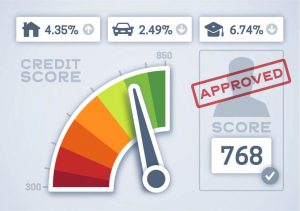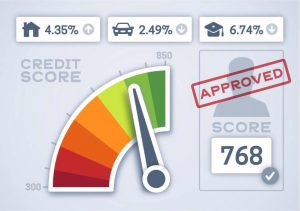Managing your credit score
 Having good credit is important for many reasons and your creditworthiness is reflected by your credit score. A good credit score can do the following:
Having good credit is important for many reasons and your creditworthiness is reflected by your credit score. A good credit score can do the following:- speed up large purchases and qualify you for certain purchases (e.g. car rental)
- lower interest rate you pay
- improve your employment options or ability to rent an apartment
- lower your insurance premiums.
Your credit score is a measure of your creditworthiness, ranging from 300 to 850. It is based on the following five categories:
- how much debt you have
- your payment history
- your debt utilization ratio - the ratio of total debt to total assets
- how far back your credit history goes
- your mix of various types of credit.
Here are five things that can kill your credit score and lessen your chances of getting an affordable loan:
- Making late payments. Payment history counts for 35% of your total score, so it’s very important to pay on time. Also, if you’re late on a payment, it stays on your credit report for about 7 years. A single late payment can lower your score by as much as 80-110 points.
- Carrying a big balance. 30% of your credit score is based on your debt utilization ratio. So, carrying a balance of a high percentage of your available credit can hurt your score.
- Closing a credit account. This goes along with #2. If you close one of your accounts because of security concerns or just because you don’t want any more credit, you might actually be hurting your credit score by raising your debt utilization ratio. As an example, if you have two credit cards with $1000 limit each and have a $500 balance on one, you have a 500/2000 – or 25% – ratio. Closing one of your accounts doubles your ratio to 500/1000 – or 50%.
- Opening an additional credit account. This is not really a killer, but just be careful not to open too many accounts at once. People who open new accounts are considered a higher risk immediately after opening an account. Also, when you apply for a new account, the credit card company needs to check your credit. This automatically dings your score 5-15 points. Any negative effect of opening a new account usually lasts only about 6 months.
- Defaulting. This (foreclosure, credit card chargeoff, bankruptcy) is the single worst thing you can do to your credit. Any of these actions can knock your score down 200-250 points. If it happens, you can start building back your score by making on-time payments, keeping a low balance, and possibly taking out a small loan and paying it off.
Often, doing it yourself is the best way to repair your credit. The Federal Trade Commission’s “Credit Repair: How to Help Yourself” explains how you can improve your creditworthiness and lists legitimate resources for low-cost or no-cost help.
Whatever you do, don’t give up. Even if you’ve made some of these mistakes in the past, present good behavior can make up for a lot. Usually within about 2 years of consistently paying attention to your accounts, you can raise your score to a good level.
We have excellent online resources and books to help with you manage your personal finances.
View complete list












